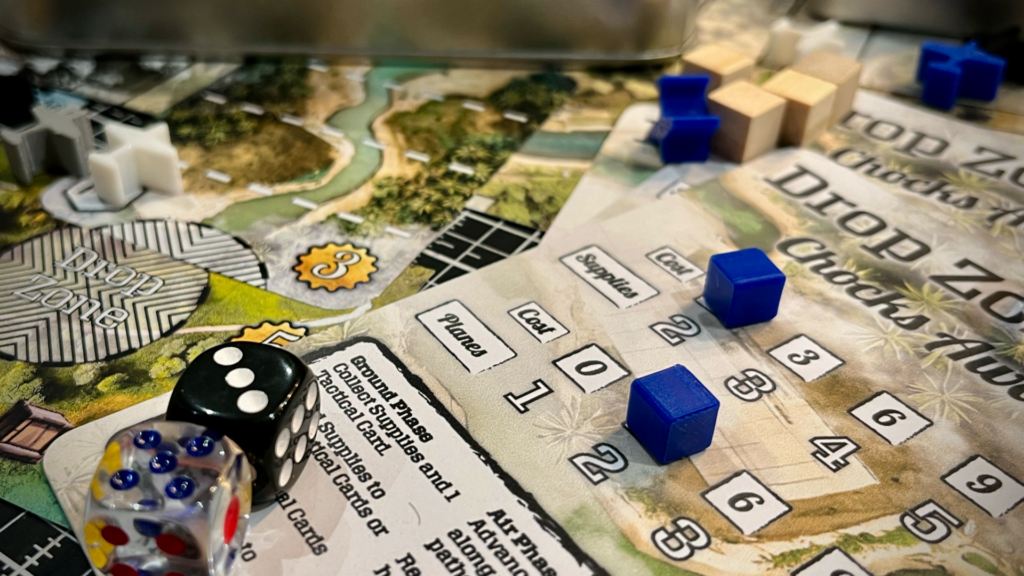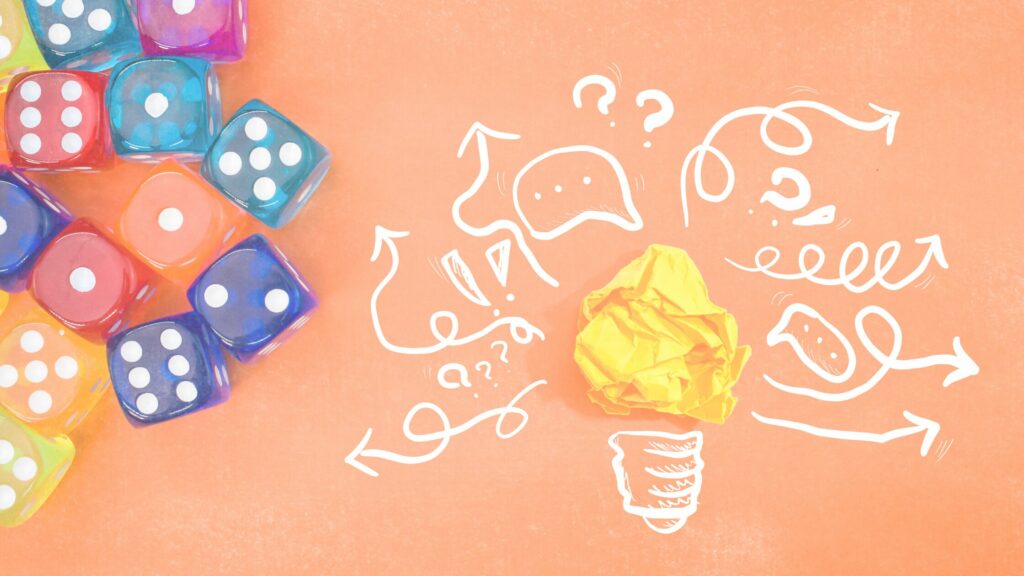
I’m a little obsessed with creativity and ideas. And, with there being so many wonderfully creative designers out there, I wanted to take the time to understand creativity from as many perspectives as possible. In this post, I have a conversations with Derek from @boardgamebossllc. Head over to instagram to check out his channel!
As you read this new post, a little ‘subscribe’ banner will pop up. It’s annoying, I know, but I’ve put it there for a reason – building this blog and its following is important to its success and the success of my games. So feel free to ignore the box, and then when you’ve read the blog you’ll find another opportunity to subscribe at the bottom of the page. If you enjoyed what you read, then please consider subscribing.
Joe: hey, thanks for agreeing to this conversation. This is going to be part of a series all about creativity and ideas. I’ll start us off with a question.
What’s the most creative thing you’ve seen in board games?
Derek (Board Game Boss): Recently, I was really impressed by a board game called ICE. I think this game really pushes the boundaries of what a board game can be. The base of the board magnetises together and forms a border to set the hex tiles into. Then you layer the hex tiles on top of each other. The theme is something along the lines of scientists digging into the ice, so as you play, you’re able to remove hex tiles to reveal the tiles underneath. This is such a brilliant example of meshing theme, mechanics, and components. My favourite part of design is getting those three things to flow and compliment each other, so when I see other designers do this, it makes my brain very happy. And the artwork for the game is beautiful. It’s the first game in a long time that’s made me go “wow! This looks incredible!”.
What game have you played more than any other game and what is it that brings you back to it?
Joe: Unmatched. It blows my mind how they’ve put that game together. Each character with its different deck and abilities all effortlessly sharing the same space. And each character plays so well, their cards and abilities mean you play like you imagine that character might fight – Spider-Man jumping in and out, T-Rex smashing their way through the jungle. The ideation and creativity that underpins each character is immense!

As designers we need to create new ideas for our games, how do you get yourself into that ideation zone?
Derek: A lot of my ideas come from watching movies or tv. I’ve always been a ‘theme first’ type of designer so when I see an awesome scene, I think “What would this look like if it was a board game? What are the characters feeling in this moment and what mechanics could recreate that feeling so that it translates to the players?” These ideas don’t always translate to a good game, but they’re fun thought exercises that I find valuable for flexing my design brain. I also keep a running list of game ideas for whenever I get the urge to work on a new project. The most recent idea I had was the Toy Story Army men leaving Andy’s room to complete various missions around the house and trying not to get vacuumed, stepped on, eaten by pets, melted, etc. in the process.
When you run into design burnout on a game that you’ve been working on for a while, what are your strategies for getting past it?
Joe: I’m all for the Toy Story game idea!! Time and patience, first and foremost – although these are easier said than done. I also find sleep can help – if I go to bed with a challenge rolling around my brain, I often find my unconscious mind has made some progress on it by the morning. I also find it useful to play some similarly themed games, to see if there’s any ideas that might unlock a path in my own game. Finally, talking about the challenge – I’m not a secretive designer, I get a lot from sharing my challenges and then listening to the thoughts of others. Sometimes this proves a little too much though – lots of people have lots of ideas, and it’s my job to sort out what to explore further and what to leave behind.
What are you working on at the moment? And can you talk through exactly how that idea came to life?
Derek: Sharing has become a favourite strategy of mine as well.
I have two projects that I’m working on. The game that has most of my focus currently is called Dice Duels. It’s a simultaneous dice rolling game that is meant to simulate a 1v1 sword fight. The original idea for the game was based on the sword fight scene in The Princess Bride between Inigo and Wesley. I asked myself what a game would look like that was trying to simulate a 1v1 sword fight. I had played several simultaneous dice-rolling games around that same time and I thought that would be an interesting core mechanic for this. It’s gone through a dozen iterations at this point, but I feel like I’m finally zeroing in on the feel that I want. I’ve experimented with a bunch of different mechanics though and what didn’t work for this game may very well work for a future project. My design partner and I had some cool ideas that I would gladly repurpose. And we’ve also learned a lot about how to communicate with each other. The whole thing has been a wonderful playground for design experience and I can feel myself growing as a designer.
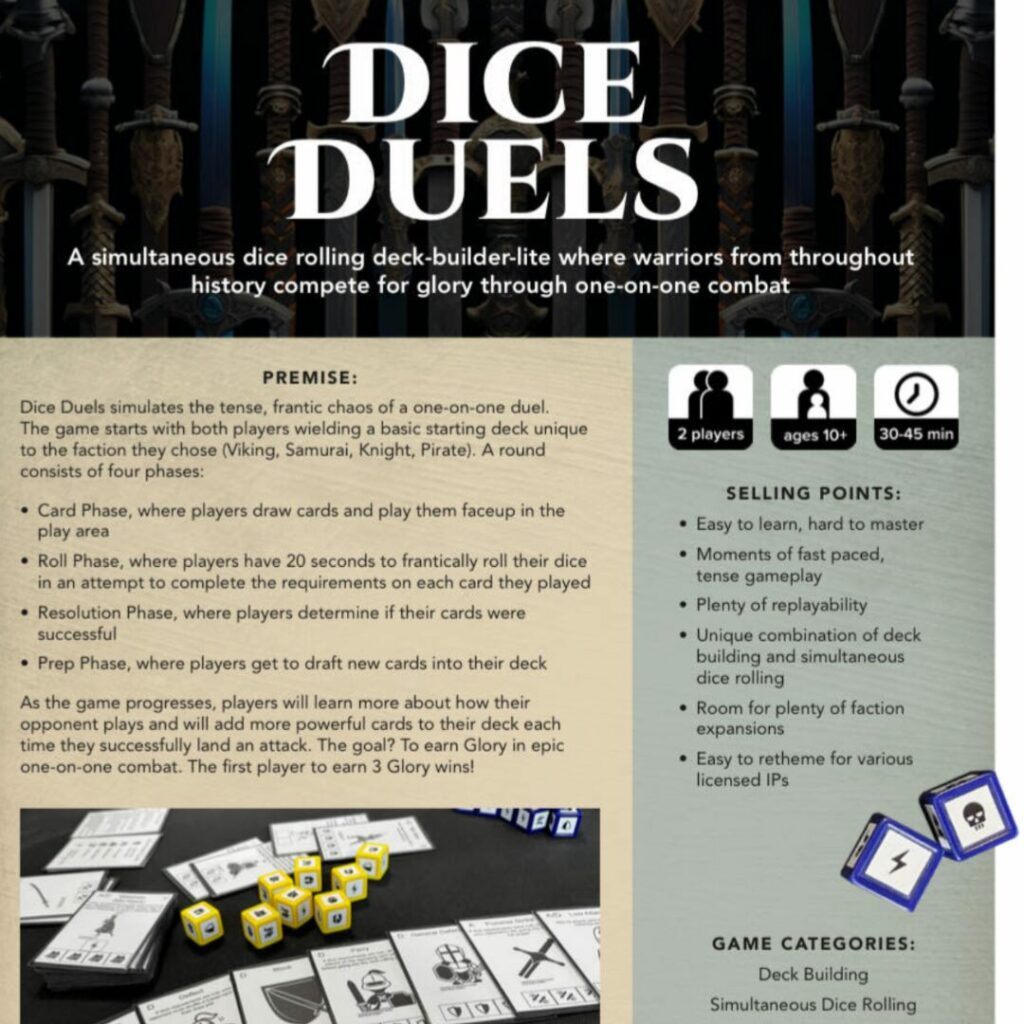
Do you design mostly solo or do you have dedicated people that you design with?
Joe: I have a design partner, Sam, who I work closely with to develop Drop Zone. We also have other individual projects that we’ll support each other on from time to time. My game ideas come solo – the development is a partnership. Sam’s great for suggesting the start of the next iteration on a game, that “wouldn’t it be good if…” sort of thinking. For Drop Zone, I then explore those ‘what ifs’ further and see what they do to the game and whether they are a good fit. Perhaps they solve a problem we’ve found in play testing, or maybe they provide a nuance to the game’s theme, and sometimes they get chucked! To do my best work, I need other people around; other brains to bounce ideas off. They need to be the right sort of people, ones that are open to exploration, and don’t mind if ideas don’t make the final cut!
Ideas are coming in all the time, how do you prioritise? How do you make sure you don’t get distracted?
Derek: Sounds like you and I have a very similar design situation. My partnership with my best friend Joe works very similarly to this.
This is an excellent question. I think the answer will look very different depending on the situation of the designer. Using myself as an example, I don’t work for a board game company. I’m not on any sort of deadline and while my final goal is to get my games published, my financial well-being is not tied up in getting my next game to market. I’m an entrepreneur and small-business owner and I do everything solo at this point, so Board Game Boss takes the majority of my focus. I use a lot of my freetime to work on my current game project, because I really enjoy design. Then, my partner and I have a standing meeting every Monday for about 2 hours where we talk through any progress we’ve made in the past week, discuss our next steps, and push forward from there. As I mentioned earlier, we have two projects currently, and the reason the second project came about was due to burnout on the first. We both agreed at one point that we needed some time away from Dice Duels while we both mulled over some ideas on how to proceed. While we were letting that one sit, we decided to work on a new project that we selected from our list of ideas. I firmly believe that passion breeds passion, so we talked through a few different ideas and tried to pick out the one we were the most excited about. If I feel indifferent about a topic or mechanic, there is no way I would want to spend months on end working on that idea.
okay, I’m going to let my subconscious mind mull this one over for a while
Board Game Boss
I’ve found that having two projects to shuffle between has actually been really valuable. I think burnout happens to everyone, no matter the career. Finding out how to manage burnout is the important part. When I find that my inspiration for a project has run dry, I’ve found it really nice to have a backup project to switch to. That way, I’m still making progress on a design, I’m still flexing my design skills, I’m still learning, and hopefully that will end up bringing about inspiration for the other project. Now I don’t feel bad about saying, “okay, I’m going to let my subconscious mind mull this one over for a while.”
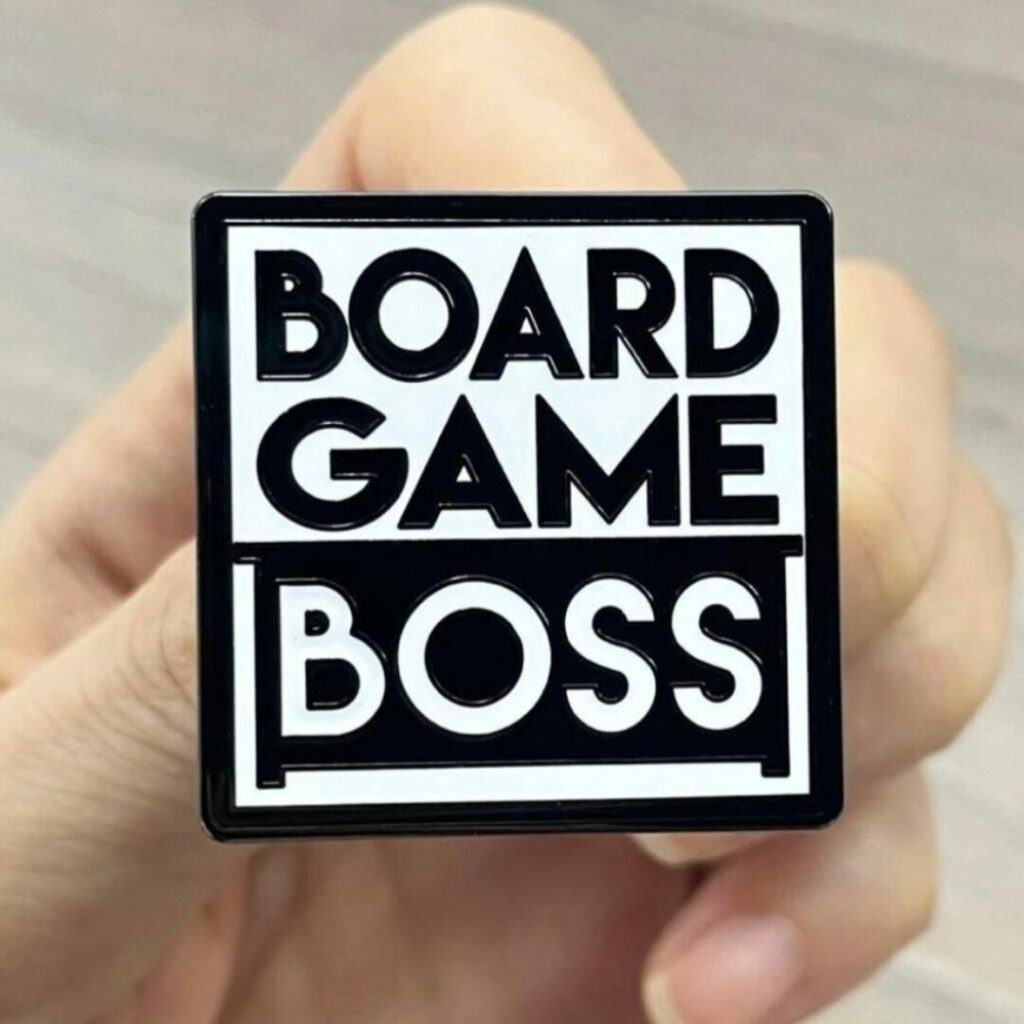
And just like burnout, I find distraction is inevitable as well. I schedule distraction time into our weekly calls for this reason. At least once a month, I’ll say, “Hey, so I had this idea over the weekend and I’d like to take the first 20 minutes here to talk it through and see if it has any merit.” And if it does have merit, I’ll add it to our list of potential projects. If not, it was a fun design problem to talk through. Several designers that I’ve spoken to who are actively pitching their games to publishers have 5-10 games ready to pitch, depending on the type of publisher they’re talking to. This may sound negative, but in an industry that publishes several thousand games a year, pitching a single game and hoping that it’ll become one of the handful of games that has staying power is very unlikely. The more merrier.
I’d love to hear a rundown on Drop Zone Chocks Away. Where did the inspiration come from? Where are you in the process, etc?
Joe: Having a few things on the go sounds like a good way of keeping new ideas flowing!
The inspiration from Drop Zone Chocks Away came from playing games. This is often the case with my ideas. I’m quite good at spotting connections between things, or taking two ideas and working out what lies in between them both. About a week before Drop Zone entered my brain I’d played two games: Moonrakers and Hit the Silk. Two very different games, but there was something about both of them that collided in my head. A week later, I’d woken up with a new game in my head!
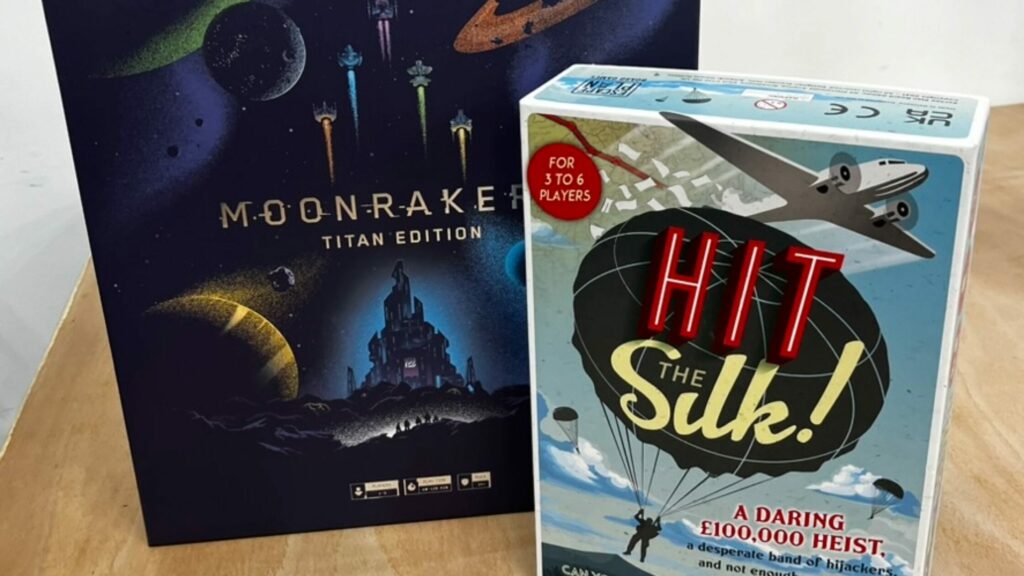
The current iteration of that game is now so wildly different from either Moonrakers or Hit the Silk that apart from an aviation theme I don’t think you could confidently say that it came from either. At the moment the game in in near final testing stages, we’ve got minor tweaks still happening but the big changes are behind us. It feels like a good place to be in, although a bit daunting as the next phase is getting the game out in front of people for review! And if anyone wants to sign up to playtest the game they can do here.
Right, last question: What advice would you give to people who would like to make games but might struggle with the “new ideas bit”? I’d say, play games, all sorts, games you like and games you don’t and then think about what you enjoyed and how different parts might fit together in new, novel ways. What about you?
Derek: Excellent question! I wholeheartedly agree with your answer. Do everything you can to consume board game content. And if you’re a very busy person like me and sometimes have a hard time scheduling board game nights, find other ways to consume that content. There are some excellent podcasts out there, like Board Game Design Lab. I also enjoy Adam in Wales on YouTube. You may not be playing the games themselves, but hearing people who are experts in their field speak to their design process can be incredibly valuable.
And to expand on the question a bit, maybe mechanics come easy to you and it’s theming that you struggle with. If you need ideas on how to theme your game, I recommend drawing from things that you already connect with. More and more, I’m realising that the theme in isolation doesn’t matter so much. It’s more important that the mechanics and theme mesh together well. We see proof of this constantly. If you’d have told me a few years ago that the next big game was an engine builder about birds, I’d have laughed. So draw inspiration from the things that you love and find the mechanics to match.


